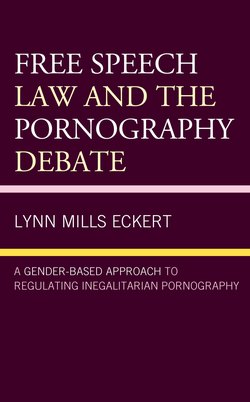Free Speech Law and the Pornography Debate

Реклама. ООО «ЛитРес», ИНН: 7719571260.
Оглавление
Lynn Mills Eckert. Free Speech Law and the Pornography Debate
Introduction
Epistemology: Defining a Particular Understanding
Epistemology and the Law: Content-Neutrality, Causality, and Discursive Effects
Notes
Sociology of Knowledge: “We Already Regulate Pornography for Gender-Based Reasons without Acknowledging It”
Regulating Pornography Comparing the Zoning and Nude Dancing Cases to Hudnut
The Zoning Approach to Regulating Pornography: Young, Renton, Pap’s and Alameda Books
The Civil Rights Regulative Approach: American Booksellers v. Hudnut (1985)
Conclusion
Notes
Language Games and the Zoning and Nude Dancing Cases
Defining Adult Establishments
Defining Pornography as Erotica
The Language of Secondary Effects and the Submergence of Gender
Conclusion
Notes
The Legal Landscape that Acts to Exclude Knowledge Claims about Pornography
Categories and Epistemic Gatekeeping in Free Speech Jurisprudence
Secondary Effects Doctrine and Content-Neutrality
Defining Pornography and. Its Categorical Implications
Harms (Community-based or Gender-based) and Evidentiary Standards
Conclusion
Notes
A Critique of the Content-Neutrality Principle
The Communist Menance: Union Organizing and Subversive Speech
How and Why Dissident Speech. and Klan Speech Became Conflated
R.A.V. v. St. Paul (1992): A Radical Interpretation of Content-Neutrality
Conclusion
Notes
Pornography Harms: Where Speech Act Theory, Causality, and the Performative Fall Short
A Brief Summary of. the “Pornography as Speech Act” Argument
Judith Butler’s Critique of Pornography and. Hate Speech as a Speech Act
The Causal Argument
Conclusion
Notes
Discursive Effects
Defining Discursive Effects
The Phenomenology of Oppression, Psychic Alienation, and Recouping Subaltern Knowledge
Conclusion
Notes
Liberal Law and a New Theory of Harm
Discursive Effects and Liberal Law
The Relationship between Discursive Effects and Egalitarian Liberalism
Brown v. Board of Education (1954), Dignity, and Speech
Brown, Pornography, and Discursive Effects
Conclusion
Notes
Reconsidering the Tension between Liberty and Equality
The Classic Liberal Formulation of. Liberty Versus Equality
A Third Way
The Canadian Way: A Better Balance. Between Equality and Liberty
Conclusion
Notes
Conclusion
Notes
Bibliography
Index
About the Author
Отрывок из книги
At the broadest level, this book is about the epistemology of law while at the narrowest vantage it is concerned with the possibility of placing gender-based regulations on inegalitarian pornography. In making a case that epistemology can help us find our way through the highly contentious debate about regulating pornography, I examine free speech categories, concepts, and rules. Everything from how to define pornography, to whether pornography constitutes speech or a practice, to whether it harms concerns epistemology. By examining the highly contested legal debate about the regulation of pornography through an epistemic lens, the book project hopes to reveal insights into competing claims about the proper role of speech in our society, pornography’s harm, the relationship between speech and equality, and whether law should regulate and, if so, upon what grounds.
In examining the legal debate about pornography from an epistemic lens, the book adopts a particular approach to epistemology, one that both problematizes and retains notions of truth and objectivity while recognizing that desire and power play a role in producing knowledge.[1] It recognizes the linguistic turn in philosophy as well as where “an epochal shift in philosophy and social theory [has taken place] from an [traditional] epistemological problematic, in which mind is conceived as reflecting or mirroring reality, to a discursive problematic, in which culturally constructed social meanings are accorded density and weight.[2] Relying on studies and measures of harm alone will not end the debate about porn’s regulation. The empirical variables rest upon the social construction of meaning and the way that construction informs the epistemological understanding of the problem. The discursive problematic ranges from the social construction of sexuality, masculinity, femininity, freedom of speech, harm, and equality. Such an understanding of epistemology, which in colloquial terms means the study of “how we know what we know,” borrows from the criticisms of the sociology of knowledge, feminist epistemology, continental theory’s understanding of meaning and interpretation, critical theory, and poststructuralism.[3] In varying degrees, those criticisms have demonstrated that none of us have a God’s-eye-view-from-nowhere and that the ability of humans to access the unfiltered truth isn’t possible. In short, we are fallible, bringing our own cultural, historical, and social biases or prejudgments with us when attempting to validate or invalidate truth claims. Our ability to establish truth upon a solid metaphysical foundation isn’t possible.[4] These insights should influence legal discussions about porn’s meaning, the categories law deploys, whether it harms, standards of evidence and appropriate regulations, if any. Truth matters, but it may be a moving target depending on context and power. Moreover, law may have to respond to the idea that we have no access to enduring truths, requiring law to accommodate changes as material conditions and context changes.[5]
.....
Satya P. Mohanty, Literary Theory and the Claims of History: Postmodernism, Objectivity, Multicultural Politics Oxford University Press, 1998). Linda M Alcoff, “How Is Epistemology Political?,” in Radical Philosophy (Philadelphia, PA: Temple University, 1993). Michel Foucault, Power/Knowledge: Selected Interviews & Other Writings 1972-1977, ed. Colin Gordon (New York, NY: Pantheon Books, 1980). A. Levin, Cost of Free Speech: Pornography, Hate Speech, and Their Challenge to Liberalism (Palgrave Macmillan, 2014).
9.
.....